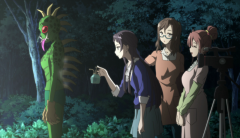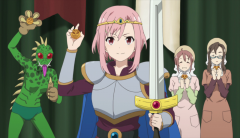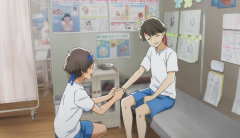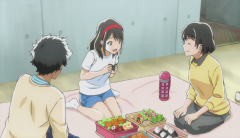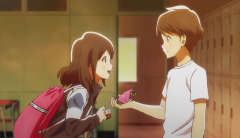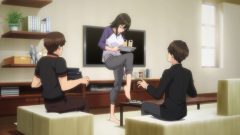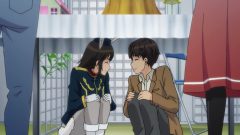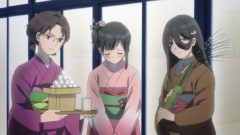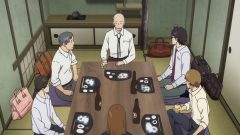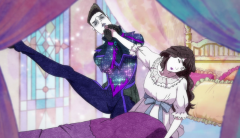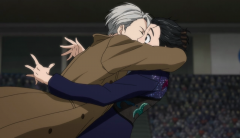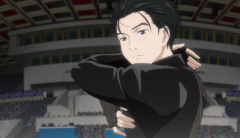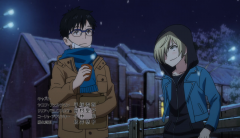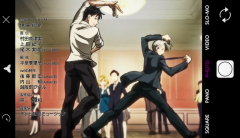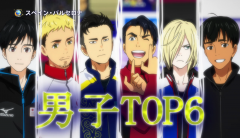“Can you hear my heartbeat? Tired of feeling never enough.
I close my eyes and tell myself that my dreams will come true”
That’s exactly what Yuri on Ice offers, a heart-pumping ride to the sport of figure skating. Yuri on Ice’s current success and mainstream breakout is something that no one could have guessed before it aired; but here we are. As the show progressed, it picked up fans along its way, enthusiasm comments episode after episode, even the professional skaters are quite fond with the anime. So really then, how good is Yuri on Ice exactly? Well, let me put it this way, this show is vastly different than your regular anime out there, down from its sheer ambition alone (this is a passion project from one of the most promising anime director), the well-detailed struggling productions (which for me that doesn’t hurt the show, quite the opposite really as I find it adds to the show’s charms) and most famously the very positive portray of gay male romance and of characters from different backgrounds.
Yuri On Ice follows a season-long of Japanese figure skater Yuri after Victor- the current world champion skate figure- decided to take a year break in order to coach Yuri to win the world gold. He then trained and competed with other world class competitors from around the globe, especially with his rival: teen prodigy Yurio from Russia. I have briefly mentioned this before, but sports like figure skating or gymnastics or some performing martial arts are more akin to performing arts (think of dancing, acting or opera singing or ahem… band concerting) than the competitive nature of other sports. While other sports emphasis mainly on winning, those kinds of sports also aim for aesthetic and beauty. Beauty rules. Beauty rocks. Beauty is king. That’s why to do figure skating justice is a tricky job, as you have to both show artistic expressions of each individuals, as the same time still make the sport competitive. On that front, the show’s rather unusual approach of focusing entirely on the routines of each players elevate those parts I mentioned rather nicely, but writing-wise, it leaves a lot to be desired.
The show, at its core, is one huge theme about expressions, as expression is the very nature of figure skating, and through the performances the characters have a space to express their personalities, as well as their own struggles. Even our main character, Yuri, scrambles throughout the series to express his “love” for himself, for the sport and for his coach Victor. Many of the routines are of course over the top and hilariously silly (like the Italian’s sibling complex or the sex appeal ending routine of the Swiss guy, Christophe); but through those performances each player has his own little arc to dwell into and it’s certainly entertainment to watch both their smooth movements and their stream of thoughts from those guys. Every player, as a result, has certain unique traits and each of them add their own colors to this colorful world. I certainly enjoy the company of most of them.
But the hot of Yuri on Ice lies on the “bromance” relationship between our two men: Yuri and Victor. Week in, week out, the exclamations of many passionate fans: “Did they or didn’t they…?” would float up and soon become a massive storm of all kinds of responses. While this sucks that the show as brave as this one wouldn’t go all the way to announce their romantic relationship, it’s all clear in the context. I would say that this series greatest’s strength is the show’s positive depiction of same-sex relationship between two men. Positive but not realistic. I will get to the unrealistic part later but for once, this romance feels exactly how the two persons attracting to each other, the way they cling to one another and try their best to surprise the other partner. I’m glad the show see them as real characters, and describe their relationship not for the shake of shocking the anime world (although it did). More importantly, this homosexual relationship is a positive and necessary statement to both the sports community and the countries where those characters are from; as sports have history of homophobia from way back and the real life gay figure skater Johnny Weir, struggled to this very issue throughout his whole career. In addition, Russia specially also has a history with homophobic and Japan themselves is still debating on legalize gay marriage in their country (well, Australia is still debating as well. What’s wrong with you people? If someone want to marriage, give them the rights to!), so in episode 10, when Yuri and Victor giving rings (even in the name of good luck charms), it is a clear message for gay rights and I honestly wouldn’t wish it other way. If only other shows willing take such risks like that.
As for the unrealistic part, I’m going to be brief but the premise alone about Victor “suddenly” visits his hometown and declared to be his coach is really a wish-fulfilment plot device. We did learn in the end that Victor was swayed by the drunken Yuri but really this is something that only works in fiction. Even setting aside the mechanism, Victor willingness to see Yuri as his partner at all cost, while fun to watch, isn’t seem real at all. Furthermore, their relationship is depicted mostly in positive light, but when you think about it, putting two people with different backgrounds will of course result in culture shock. Even a small gesture from one side can be interpreted different by the other, but the show brushes any of that off and even more conveniently they made those characters communicate well to each other like they are all come from the big Japan. They do argue with each other but after a while they are overwhelmed by other’s feeling, as I take it as they are still on the early stage of relationship. If they truly can stay together, they will need to see the dark, vulnerable side of each other and as of now I don’t see any of that being shown in the series. Call me cynical guy but yeah while I still enjoy their relationship, it’s just not the real presentation of what true relationship is.
Another strong point that I am personally digging it from the show is how they handled the characters from different backgrounds with stereotype-free for the most part. Like how when you think about an anime American character, you’d think of the blonde, ruthless money-obsessed guy, but the American we got from this anime is the Mexican-background Leo de la Iglesia. Or for the country that is hot and wet all year and don’t even have snow in winter like Thailand, skate figure is the very unnatural sport, but to present a Thai character who is proud of being the first Thai to reach the final stage? That is a phenomenal touch and that approach strangely makes those characters feel so rich and universal.
But because of the show’s choice to concentrate on the performances, many problems arise. First, in order to be more focus, they can only emphasis on the Yuri’s growth and his relationship to Victor, and most of other parts are either undercooked or being neglected all together, especially for those non-professional characters. Remember Yuko? Or Minako? Of course not because basically after the first few episodes their roles are basically over, and the show reduces them to crazy bitch fans. How about their dogs? What happened with Victor’s dog afterward? Also, that part where Victor had to rush home for his dog is poorly constructed so that it feels very forced. Yurio gets some more screentime than the rest, and I particularly enjoy his moments with his grandpa, and with Otabek, but I feel his rival with Yuri is underdeveloped, especially towards the end when the person Yurio often pissed off weren’t Yuri but Victor. Also, I find the ending is so rushed that I would love for some more time to see the aftermath of those main characters.
The repetitive nature of those routines is also their drawbacks. Although of course they are slightly different, with the jump sequences are changed each time and we can see the character’s progression after each routine, it still can’t hide the fact the we listen to the same music, see the same performances for a good number of time. I have lost counts on how many times I’ve seen Yuri perform his pieces (by my count right now, 5 times for each program), as a result it makes the story as a whole rather predictable. There are also some sequences that I can see the huge graded down in terms of quality, but as I said earlier for those parts that did work, the choreography of the performances is something to behold, the animation is one of the fluidest I’ve seen this season and those shaky productions still managed to maintain my attention throughout the show. The music is all around great and creative, and further assist to make all the characters so distinguishable with each of them have their own unique theme song that speak a lot to their characters. I would definitely buy their soundtracks if it ever releases as a physical CD.
As a final impression, I am glad that we have this show. Yuri on Ice stands out in more than one way and if anything, its unexpected mainstream appeal means that Sayo Yamamoto will have more artistic control over her next project, which is a huge bless for everyone. As for the show, they’re not quite there to make history yet, but there’s no denying that Yuri on Ice is a special show.



